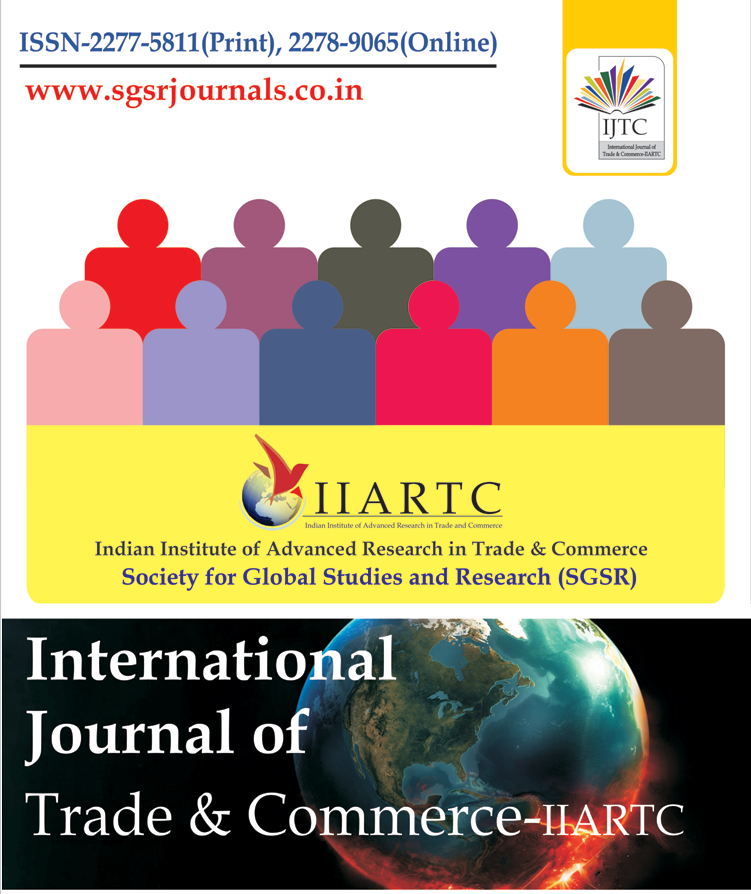Home ⇨ International Journal of Trade & Commerce-IIARTC

International Journal of Trade & Commerce-IIARTC
Impact Factor (IF):5.135 (COSMOS), IF:7.249 (ISRA), IF:3.721 (ISI)
ISSN:2277-5811 (P), ISSN:2278-9065 (O)
Frequency: Half Yearly
Islamic Banking in Bangladesh: A Case Study of FSIBL and Implications for Indian Islamic Banking Prospects and Societal Banking
Islamic banking is reshaping Bangladesh’s financial landscape by offering a Sharia-compliant alternative to conventional banking, particularly through innovative community-driven micro-savings and micro-investment models. This qualitative study analyzes First Security Islami Bank Limited (FSIBL), Bangladesh’s first full-fledged Islamic bank (est. 1999), to draw insights for India’s emerging Islamic banking sector. FSIBL’s success in applying profit-loss sharing (PLS) models—such as Mudarabah-based micro-savings pools converted into agricultural investments and Bai-mode financing for SMEs—alongside mobile banking-enabled societal banking initiatives, demonstrates how Islamic finance can bridge financial inclusion gaps in developing economies. The bank’s CSR-linked community investment programs, which transform small deposits into Waqf-funded local projects, offer a replicable template for India. However, recent governance lapses and liquidity crunches highlight systemic risks in scaling these models without robust safeguards. The study addresses two questions: (1) How does FSIBL’s integration of microfinance with Islamic principles validate its viability in emerging markets? (2) What lessons can India adopt to leverage societal banking wings for grassroots capital formation while avoiding governance pitfalls? Findings reveal that participatory micro-investment frameworks require three pillars: strong Sharia governance (e.g., community oversight committees), depositor protection mechanisms (e.g., taka ful-backed micro-savings), and adaptive asset-liability management (e.g., blockchain-tracked PLS ventures). By examining FSIBL’s journey, the paper proposes actionable strategies for India to harness Islamic banking’s dual social-commercial mandate, advocating for regulatory sandboxes to pilot community savings-to-investment chains and tax-neutrality for micro-investment products. The study concludes that India’s vast SHG networks and digital infrastructure position it to outperform Bangladesh’s model—if integrated with ethical resilience and operational transparency.
Author:Abu Sayed, Nabila Aktia Chowdhury
Abstract:Islamic banking is reshaping Bangladesh’s financial landscape by offering a Sharia-compliant alternative to conventional banking, particularly through innovative community-driven micro-savings and micro-investment models. This qualitative study analyzes First Security Islami Bank Limited (FSIBL), Bangladesh’s first full-fledged Islamic bank (est. 1999), to draw insights for India’s emerging Islamic banking sector. FSIBL’s success in applying profit-loss sharing (PLS) models—such as Mudarabah-based micro-savings pools converted into agricultural investments and Bai-mode financing for SMEs—alongside mobile banking-enabled societal banking initiatives, demonstrates how Islamic finance can bridge financial inclusion gaps in developing economies. The bank’s CSR-linked community investment programs, which transform small deposits into Waqf-funded local projects, offer a replicable template for India. However, recent governance lapses and liquidity crunches highlight systemic risks in scaling these models without robust safeguards. The study addresses two questions: (1) How does FSIBL’s integration of microfinance with Islamic principles validate its viability in emerging markets? (2) What lessons can India adopt to leverage societal banking wings for grassroots capital formation while avoiding governance pitfalls? Findings reveal that participatory micro-investment frameworks require three pillars: strong Sharia governance (e.g., community oversight committees), depositor protection mechanisms (e.g., taka ful-backed micro-savings), and adaptive asset-liability management (e.g., blockchain-tracked PLS ventures). By examining FSIBL’s journey, the paper proposes actionable strategies for India to harness Islamic banking’s dual social-commercial mandate, advocating for regulatory sandboxes to pilot community savings-to-investment chains and tax-neutrality for micro-investment products. The study concludes that India’s vast SHG networks and digital infrastructure position it to outperform Bangladesh’s model—if integrated with ethical resilience and operational transparency.




